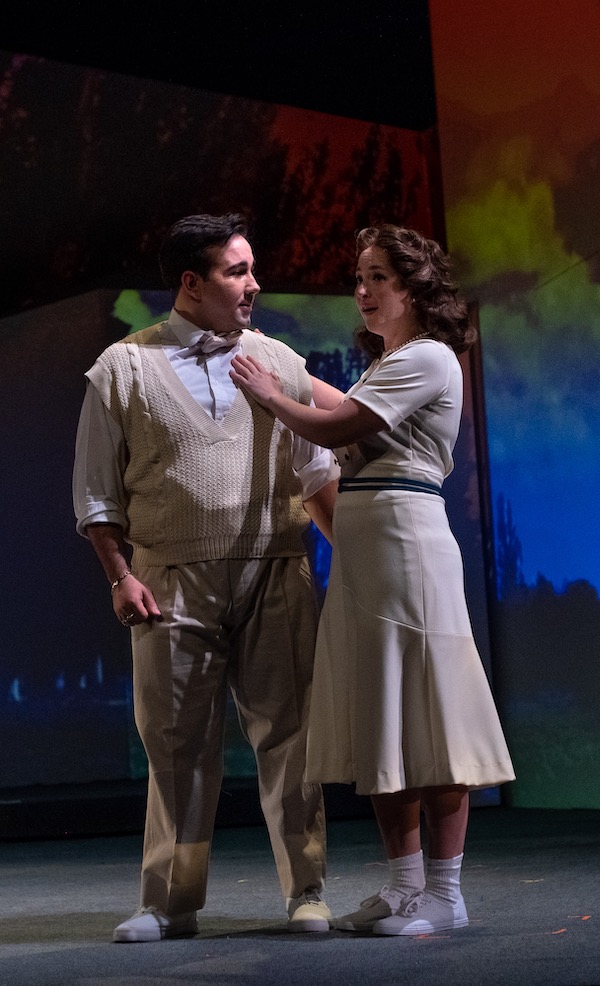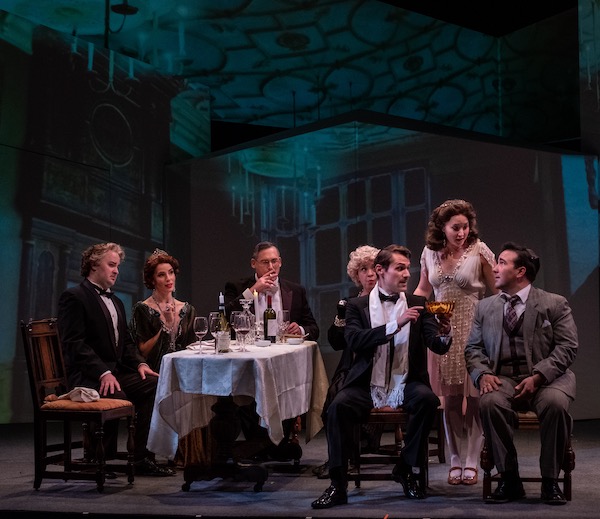NY City Opera returns with world premiere of Gordon’s moving “Finzi-Continis”

Giorgio Bassani’s 1962 novel The Garden of the Finzi-Continis is one of the great masterpieces of modern Italian literature, and was realized as a wonderful Vittorio De Sica film in 1970. Thursday night, the novel took on another new and different life, with the world premiere of an operatic version from composer Ricky Ian Gordon and librettist Michael Korie.
The evening was also the season debut for New York City Opera, which had a 2-1/2 year pandemic hiatus—made longer by this premiere being postponed for eight days due to the recent Omicron surge. But the show went up Thursday at the Museum of Jewish Heritage, uncannily coinciding with National Holocaust Remembrance Day. Though the scenario takes some time to find its footing, the opera and its production built to a climax of considerable dramatic force and emotional power.
The story takes place in Italy before and during World War II, framed by flashbacks. The protagonist, Giorgio (tenor Anthony Ciaramitaro) is a young Jewish man growing up in Ferrara. As a teenager he falls in love with Micól (soprano Rachel Blaustein) daughter of the well-to-do Finzi-Continis, a family of “High Holiday” Jews who live in a walled estate, complete with an alluring garden and, crucially, a tennis court that brings Giorgio into the estate when new racial laws bar Jews from playing in a tournament. The characters face gradually mounting danger from Mussolini’s fascist government and impending war, but are mostly oblivious to it. They are either unable to grasp what is truly happening and just hoping it will pass. Or like the Finzi-Continis, they try to stay safe in a false world inside a world, where secular, bourgeois things like a garden, a library, even a tennis court seem to offer, if not a defense, then at least a safe space to hide.
Bassini wrote this all in a style that is pellucid and calm. There are forebodings beneath the surface, but his voice is measured, clear, even wistful with the charms of Ferrara palpable. That juxtaposition gives the novel deep beauty and tremendous power. To that, De Sica added a luminous dream overlay.
Opera is different though, a hot medium in Marshall McLuhan’s terms. With that, Gordon (who has previously adapted Steinbeck’s The Grapes of Wrath and excerpts from Tony Kushner’s play Angels in America) gives full voice to the passions inside the characters who, despite the comforts that blind them, crackle with energy.
Giorgio is the main character, with the most music and greatest demands, and Ciaramitaro’s singing was brightly colored throughout. The opera opens and closes with the older Giorgio remembering and singing gently, while in between the tenor conveyed youthful energy, and was able to bring great intensity to the drama’s climactic moments. Opposite him, Blaustein had a rounded, gentle tone and elegant phrasing, while still able to express anguish.
The opera had an old Hollywood movie feel to it, in the best way. The leads are given big star gestures, bolstered by a large ensemble of character actors, all of whom were vivid and deep in their roles. That meant not only solid singing but meaningful characterizations that were essential to the opera’s success—it gives nothing away to know that Giorgio survives the war, the tragedy is visited upon the other characters, and was greatly moving because of the humanity they conveyed.
Giorgio’s family was filled out by mezzo-soprano Mary Phillips as his mother, bass-baritone Franco Pomponi as his father, and baritone Robert Balonek as his brother Roberto. Mezzo-soprano Sarah Heltzel sang Olga Finzi-Contini, the family’s matriarch, and baritone Peter Kendall Clark was Professor Ermano. Giorgio’s father voted for Mussolini, seeing fascism as a modern alternative to the aristocracy represented by the Finzi-Continis; his mother expects the present turmoil blow over, complaining only about losing her maid.
Baritone Matt Ciuffitelli sang Malnate, the college friend of Micól’s brother, Alberto (baritone Brian James Myer), both crucial secondary characters, and both excellent performances. The most emotionally complex passages came either through, or because of, these characters, and both gave vivid, natural performances.
With so many characters and so many plot events to establish before the drama can really build, this new opera demanded some patience at the start. The libretto is heavy on sung dialogue, and that begins almost immediately—there was a brief atmospheric prelude from the chamber ensemble in the compact pit at the side of the stage, then a dense flow of words and fast chattering music. The size of the production means a pocket chamber orchestra, led with clear detail by conductor James Lowe. Their playing was colorful, though one at times wanted to hear how the music would come across with a large orchestra. Gordon has written several moments that call for that little push over the edge in volume and richness.
Things happen in a rush, the characters come in and establish their politics and views, the fascists deliver their laws. With so much to be said, some of the music comes off as by the numbers. Yet many passages, as in a tennis-playing quartet, are excellent, while a couple others, like Malnante singing about the records he loves, didn’t have the expressive depth meaning of the opera’s best music.
But this was also a subtle and intelligent formal design by Gordon. Once the groundwork was laid, the story becomes simpler and deeper, and the characters have more space to sing arias and duets. The latter, from and between Giorgio and Micól were classics of feeling and conflict—the two fall out in a brutal and painful way—but the greatest intensity came through Alberto’s music. The character mirrors the larger-scale political drama, he is unable to say out loud what he truly feels, and his own personal path parallels that of the Jews of Ferrara. In one absolutely brilliant scene at a seder dinner, his family sings about his not eating and growing thin, and the music starts as a number. Then Giorgio arrives, the two play a parlor game, and the same lyrics that began as an entertainment, even a frivolous one, become viscerally tragic.
The production is a collaboration with the National Yiddish Theatre Folksbiene, and is simple in conception and polished in detail. The staging, with concept by Richard Stafford and direction from Michael Capasso and Stafford, is a set of angular walls, keeping the characters both in and out of other spaces, and locations are projected on them. The costumes by Ildsikó Debreczeni not only fit the period but reflect the character’s personalities as they age. This was a welcome and satisfying world premiere, and an exciting return to form for New York City Opera.
The Garden of the Finzi-Continis continues through February 6. nycopera.com







